
Ulli Diemer — Radical Digressions
Notebook #8
- Disobedience
- Race and Class
- Farewell to the Guardian
- Conversation with Joy Kogawa
- Public Transit
- Other Voices April 1 issue
- MacGregor Provincial Park, April 2017 photos
- Affirming life, resisting war, reporting UFOs
- Resisting injustice
- Public Safety
- Hedy Muysson 1939-2017
- Secrecy and Power
- Only 100 cyclists...
- Official Enemies
- Smoke seen coming out of chimney!!
- Meeting the Challenge of the Right
- Left Parties
- Remembering Lissa Donner
- Protecting individual privacy – with a large dose of hypocrisy
- Collective Memory & Cultural Amnesia
- What are we eating?
- A puzzling moment in the park
- Hearts and Minds: How Do People Change?
- Looking for answers, creating alternatives
- Why aren’t we expelling Israel’s diplomats?
- Guidelines for police in dealing with mentally ill people
- Misleading figures on greenhouse gas emissions
- Their Internet or Ours?
- Massacres and Morality
- Miriam Garfinkle 1954 - 2018
- Notebook 7
Articles Lists
- Selected Articles
- Articles A-Z
- Articles in English
- Articles in French
- Articles in Spanish
- Articles in German
- Articles in Other Languages
- RSS feed
- Subject Index
Selected Topics
- Alternative Media
- Anarchism
- Bullshit
- Capital Punishment
- Censorship
- Chess
- Civil Liberties
- Collective Memory
- Community Organizing
- Consensus Decision-making
- Democratization
- Double Standards
- Drinking Water
- Free Speech
- Guilt
- Health Care
- History
- Identity Politics
- Interviews & Conversations
- Israel/Palestine
- Libertarian Socialism
- Marxism
- Men’s Issues
- Moments
- Monogamy
- Neo-Liberalism
- New Democratic Party (NDP)
- Political Humour/Satire
- Public Safety
- Safe Spaces
- Self-Determination
- Socialism
- Spam
- Revolution
- Trotskyism
Snippets
Utopian visions, be they practical or not, free our imaginations, if only for a little while, from the daily grind of struggle and worry, and allow us to dream about the kind of world we would hope to live in. Such dreams can inspire us and guide us, even if they are not always quite practical.
Utopias
From its beginnings, one of capitalism’s prime imperatives has been an all-out and never-ceasing assault on the Commons in all its manifestations. Common land, common water, public ownership – anything rooted in the ancient human traditions of sharing and cooperation is anathema to an economic system that seeks to turn everything that exists into private property that can be exploited for profit.
The Commons
Our society is obsessed with the short-term present. It devalues memories and the past. That’s the nature of capitalism, especially the speeded-up hypercapitalism of today. The past is useless: profits are made by getting rid of the old and replacing it with something new.
Collective Memory and Cultural Amnesia
Blogs & Notes
- Latest Post
- Notebook 11
- Notebook 10
- Notebook 9
- Notebook 8
- Notebook 7
- Notebook 6
- Notebook 5
- Notebook 4
- Notebook 3
- Notebook 2
- Notebook 1
- Moments
- Scrapbook
Compilations & Resources
- Connexions
- Other Voices newsletter
- Seeds of Fire
- Alternative Media List
- Manifestos & Visions
- Marxism page
- Socialism page
- Organizing Resources
- People’s History, Memory, Archives
- Connexions Quotations page
- Sources
- What I’ve been reading
- What I’ve been watching
- Miriam Garfinkle
- Moments with Miriam (HTML) – PDF
Favourite Links
- Break Their Haughty Power
- Bureau of Public Secrets
- Canadian Dimension
- Climate & Capitalism
- Connexions
- CounterPunch
- The Ecologist
- Green Left Weekly
- Independent Science News
- Insurgent Notes
- The Intercept
- Jacobin
- Johnathan Cook
- Libcom
- Marxist Archive
- Medialens
- Noam Chomsky
- Solidarity
- Sources
- More Links...
Words of Wisdom
- Never do anything against conscience even if the state demands it.
- – Albert Einstein
- Whoever is winning at the moment will always seem to be invincible.
- – George Orwell
- The best way to destroy an enemy is to make him a friend.
- – Abraham Lincoln
Snippets
It is one of the essential attributes of power that it insists on secrecy. Or, more precisely, those who wield power over others routinely claim that the details of what they do, and why they do it, are far too sensitive to be revealed to the public.
Secrecy and power
Radical Digressions
Ulli Diemer’s Notebook #8
Disobedience Other Voices – January 22, 2017
January 22, 2017 - #
The theme of the January 22, 2017 issue of Other Voices is Disobedience.
Ultimately all power structures depend on the obedience of those over whom they rule. It helps if people believe in the legitimacy of those who wield power, but the crucial thing is obedience.
Once people start to disobey in significant numbers, the dynamic of power changes fundamentally. Disobedience, especially on a large scale, shakes the power of the rulers, and increases the power of those who disobey.
Given the nature of state power, the most threatening form of disobedience is the refusal of soldiers to obey orders. In this issue, this is the form of disobedience we focus on. When soldiers begin to question the orders they are given and start regarding the authority of those who give those orders as illegitimate, the military hierarchy, and ultimately the state itself, are threatened.
In this issue of Other Voices, we recall the resistance of rank-and-file American soldiers to the Vietnam War. This resistance was a powerful factor in ending the war, probably second only to the indomitable determination of the Vietnamese to drive out the American invaders. Yet the soldiers’ resistance has been virtually erased from history. Hollywood has made hundreds of movies about the war; none shows the actions of thousands of American soldiers who refused to fight. Their resistance included not only desertion and combat refusals involving thousands of soldiers, but hundreds of instances of GIs killing their own officers when those officers tried to compel them to go into combat.
We also feature an article on rank-and-file soldiers in the Egyptian army. Virtually all of them come from the working classes, and their loyalty to the regime cannot be taken for granted. If they refuse to continue obeying a hierarchy that has soldiers repressing their own people, Egypt’s dictatorship will face a crisis.
From the Archives we feature the Principles of Nuremberg, which were used by the Nuremberg Tribunal to judge Nazi war criminals. These principles were subsequently adopted as key elements of international law. The fourth principle states “The fact that a person acted pursuant to an order of his Government or of a superior does not relieve him from responsibility under international law, provided a moral choice was in fact possible to him”. This principle makes clear that under international law, an agent of the state, including a soldier, has a duty to refuse orders that violate international law. We would do well to highlight this duty at every opportunity.
Also in this issue: an article about strikes and other forms of resistance by prisoners and by immigrant detainees: another form of disobedience against the repressive power of the state.
Other articles look at recent worker’ struggles in China, and recall the life of John Berger, the British critic and writer who taught many about different “ways of seeing” the world.
To read Other Voices online, go to https://connexions.org/Media/CXNL-2017-01-22.htm. You can subscribe to the email version by sending a request to mailroom@connexions.org.
Ulli Diemer
See the January 22 issue of Other Voices here. Sign up to receive it by email here
Keywords: Civil Disobedience – Desertion – Disobedience – Mutinies – Refusing Orders – Soldiers
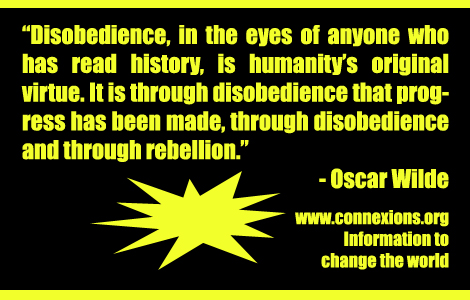
Race & Class Other Voices – February 12, 2017
February 12, 2017 - #

The theme of the February 12, 2017 issue of Other Voices is Race and Class.
Class conflict – first and foremost, the relationship between the capitalist class and the working class – is the fundamental contradiction that defines capitalist society. Class is a reality which simultaneously encompasses and collides with other dimensions of oppression and domination, such as gender and race. The relationship between race and class, in particular, is the theme of this issue of Other Voices.
The concept of “race” is a relatively recent invention, born out of the need to invent a justification for the enslavement of black Africans. Race theorists developed pseudo-scientific biological theories to ‘explain’ why Africans were ‘inferior’ and therefore could justly be enslaved. Race theory was then also used to justify and explain social hierarchy in other contexts. It is worth remembering that conservative European social thinkers long held that working people and the poor belonged to a biologically different ‘race’ than their social superiors. The French aristocrat and race theorist Gobineau wrote “Every social order is founded upon three original classes, each of which represents a racial variety: the nobility, a more or less accurate reflection of the conquering race; the bourgeoisie composed of mixed stock coming close to the chief race; and the common people who live in servitude or at least in a very depressed position. These last belong to a lower race which came about in the south through miscegenation with the negroes and in the north with the Finns.”
It was in the Americas, and especially in the United States, a society founded on slavery, that ’racial‘ divisions were cultivated and sharpened to their highest degree. After Bacon’s Rebellion in 1676, when black slaves and white indentured servants rose up together, the colonial elite began consciously to foster ‘racial’ divisions by granting poor whites a few social privileges (but not, in most cases, money or power). Immigrants who had been considered non-white and racially inferior, such as the Finns, the Irish, and Slavs from Eastern Europe, were ‘promoted’ into the “white race.”
In the eyes of Karl Marx, the division between whites and blacks within the American working class (which in his analysis encompassed slaves as well as wage-workers) was the fundamental contradiction which stood in the way of developing class consciousness and creating a socialist movement.
In the 20th century, Communists and Trotskyists in particular stressed the central importance of challenging racism in order to build a united working class movement. In the last few years, this insight has been carried forward by other social movements. The concept of ‘intersectionality’ has recently come into vogue in some circles, though others argue that ‘intersectionality’ is actually a step backward in that it assumes that there are separate ‘identities’ that ‘intersect’, an approach which can end up seeing the differences but missing the whole.
These are questions which will continue to challenge us. In this issue, you’ll find a small selection of resources from a vast and ongoing social movement. Exploring the subject links below each item will lead you to many more.
Ulli Diemer
See the February 12 issue of Other Voices here. Sign up to receive Other Voices by email here
Keywords: Race & Class – Anti-Racism – Black Liberation – Caste – Class Solidarity – Identity Politics – Inequality – Social Determinants of Health – Working Class
Farewell to the Guardian
March 7, 2017 - #
Today I sent the following letter to the Guardian Weekly cancelling my subscription:
After several decades of buying the Guardian Weekly, I have decided not to renew my subscription.
The Guardian always had its faults, but one tolerated them because it also offered high-quality journalism. This is no longer the case. What was once a serious newspaper with high standards has degenerated into little more than a propaganda sheet. One can still occasionally find quality reporting in its pages, but not when it comes to the crucial issues of our time.
On those crucial issues – such as Russia, Ukraine, Greece, US/NATO provocations and interventions in other countries, the Guardian’s bias is extreme, without even a pretense of balance or objectivity. Its campaign of vilification against Jeremy Corbyn has been nothing short of disgusting.
Why would I pay for a subscription to the Guardian when I could – if I wanted to – get the same level of ’journalism‘ for free on Fox News or the Mirror website? Why would I pay money to help pay for the salaries of people like Jonathan Freeland?
I made my final decision not to renew my subscription when the Weekly published a fawning piece about Tony Blair in the February 24 issue, followed three days later by the Guardian editorial praising George W. Bush’s return as an elder statesman. At the same time, the Guardian’s subscription solicitation urged that “You’ll help us hold the powerful to account.” When a newspaper has arrived at the point of praising war criminals while deluding itself that it is holding the powerful to account, I know that it’s not a newspaper that I want to keep receiving.
Ulli Diemer
Keywords: Corporate Media – Media Bias – Media Criticism – Media Propaganda
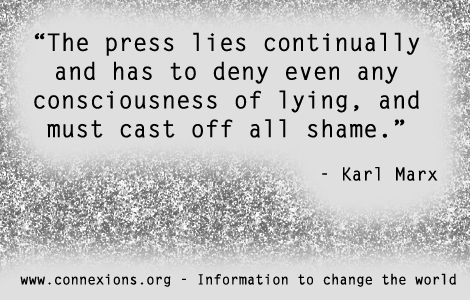
A conversation with Joy Kogawa
March 14, 2017 - #

Ulli Diemer spoke with Joy Kogawa in Toronto on March 14, 2017.
Joy Kogawa is the author of Obasan, Gently to Nagasaki, and a number other works of fiction and poetry.
Read a transcript of the interview here.
Public Transit Other Voices – March 18, 2017
March 18, 2017 - #

The theme of the March 18, 2017 issue of Other Voices is Public Transit.
Public transit – good affordable public transit – is key to a liveable city.
The old style of city, where workers lived within walking distance of their workplaces, has been replaced by a new kind of city, defined by urban sprawl and the need to commute, often over long distances, between home and work. This new kind of urban landscape, defined by and for the automobile, was deliberately brought into being by the oil industry and the automobile companies. In the United States, they bought up and then ruthlessly dismantled public transportation systems across the country, to ensure that people would have no choice except to buy and drive automobiles. In Europe and Asia, and to some extent in Canada, public transportation systems have continued to play a more important role, but there too, and indeed across the globe, car ownership has been seen as a symbol of success and affluence, and almost everywhere governments have pursued policies favouring automobiles, roads, and highways over public transportation.
If successful people drive cars, then people who need to take public transit can easily be seen as losers. Former British Prime Minister Margaret Thatcher is supposed to have said that “A man who, beyond the age of 26, finds himself on a bus can count himself as a failure.” This kind of attitude has led governments in many parts of the world to starve public transit while at the same time providing massive subsidies to create and maintain the roads and other infrastructure needed by automobiles.
But one of the paradoxes of automobile-dominated cities is that they cannot function without public transportation. Most of the people who do the low-paid work without which modern cities cannot survive can’t afford to buy and operate cars – and if they could, cities would be paralyzed by gridlock. Urban capitalism depends on minimum-wage jobs and precarious work, so the state has to provide some level of transit service for the people who do that work.
All too often, however, the service provided is inadequate and unreliable. Why spend more money than absolutely necessary to serve the needs of working people and the poor, who are often immigrants and members of racialized minorities?
Around the world, there are movements of transit riders fighting for better public transit. A key perspective guiding many of these struggles is the idea that transit should be free, that is, paid for not by fares, but out of general revenues. This is how roads are normally funded: their construction and maintenance are paid for by taxes, rarely by user fees.
Free public transit by itself would not be enough, however. We also need good transit, transit that runs frequently and goes where people want to go. It also needs to be pleasant and safe. This requires substantial new investment.
The cost of building and providing transit systems cannot be ignored. Real estate developers continue to perpetuate and worsen sprawl, building widely dispersed subdivisions which cannot be served by transit in any reasonably affordable way. Thus they continue to worsen society’s dependence on cars at the very time when the climate crisis requires us to radically reduce our dependency on the automobile. It is clear that government regulations have had little impact on the behaviour of real estate developers. The issue that we will have to address sooner or later is the question of private ownership of land: the strange idea that rich people and corporations should be able to buy land and then do with it whatever they please.
Transit struggles, such as the ones described in the articles in Other Voices about Belo Horizonte, Brazil, and Los Angeles, have met with success to the extent that they have formed alliances between drivers and riders. One favourite strategy of governments is to blame high fares and poor service on ‘greedy’ transit workers, whose demands for good pay and working conditions supposedly leave governments with no choice except to cut back on service. Divide and conquer is the favourite tactic of those in power, and to fight back successfully, we need to recognize that tactic and reject it.
Ulli Diemer
See the March 18 issue of Other Voices here. Sign up to receive Other Voices by email here
Keywords: Public Transit – Public Transportation – Public Services – Environment/Role of Public Transit – Urban Transit
This article is also available in Arabic, Chinese, and Farsi.
Other Voices – April 1, 2017
April 1, 2017 - #
Other Voices always strives to present alternative views on important topics. The April 1 issue offers some really alternative perspectives and even some “alternative facts.” As always, read critically – and enjoy.
See the April 1 issue of Other Voices here. Sign up to receive Other Voices by email here

Photo by Angelika Scheffler
Photos from MacGregor Provincial Park, April 2017
April 2017 - #

Sunset at MacGregor. Photo by Miriam Garfinkle.
Click here to visit the photos index page.
Affirming life, resisting war, reporting UFOs Other Voices – April 30, 2017
April 30, 2017 - #
 The theme of the April 30 issue of Other Voices is Affirming life, resisting war, reporting UFOs.
The theme of the April 30 issue of Other Voices is Affirming life, resisting war, reporting UFOs.
What do we do when those in power recklessly put the future of the entire planet at risk with their acts of aggression and military provocations, while they ignore the growing disaster of climate change?
We fight back and organize, on every level, wherever we are, doing whatever offers the hope of resisting and of building a movement that can stop and overturn the out-of-control monster of late capitalism.
In this issue, you’ll learn about workers, peasants, scientists and Zapatistas meeting to explore ways of ensuring that science is guided by ethics, social responsibility, and human needs. You’ll read about how indigenous women, who often experience the first and worst effects of climate change, struggle to protect their environments. In the People’s History section, you’ll find a story about the Quechua people and their centuries-long project of developing and protecting more than 2,000 varieties of potato: a heritage that is a gift to the entire world, more important than ever in the face of climate change.
We travel back to look at the historical background of the current tensions in Korea, a background that includes a long history of American attacks on, and threats against, North Korea, with the predictable result that North Korea’s leadership feels it has to deter another U.S. attack at all costs.
UFOs are not normally a topic that receives much attention in Other Voices, but in this issue we draw attention to a flood of phone calls to the hotline set up by the U.S. government for reporting illegal aliens. It seems they have been getting so many phone calls reporting UFO abductions, and describing Star Trek episodes in great detail, that the hotline (1-855-48-VOICE) is essentially out of service. Oh dear!
Our topic of the week is Militarism and Democracy. Or, more precisely, the irreconcilable conflict between militarism versus the possibility of having a real democracy.
Ulli Diemer
See the April 30 issue of Other Voices here. Sign up to receive Other Voices by email here
Keywords: Militarism & Democracy – Science and Society – Indigenous Women – Potatoes
Resisting injustice Other Voices – May 28, 2017
May 28, 2017 - #

The theme of the May 28 issue of Other Voices is Resisting Injustice.
The issue looks at the relentless persistence of people challenging injustice and entrenched power in places around the world, including Palestine, Korea, China, Canada, and the United States.
We spotlight the ongoing hunger strike by Palestinian political prisoners languishing in Israeli prisons, workers’ strikes in China, and people in South Korea taking on a corrupt government. In the United States, the Equal Justice Initiative is collecting soil from places where blacks were lynched as a way of remembering their lives and the brutally racist society that murdered them.
An article on recent terrorist attacks in Britain asks what underlies ideological violence and sociopathic rage. Ralph Nader asks why people who are supposed to be professional questioners avoid asking hard questions of those in power. An article on the Korean War relates the history of that war, and the U.S. role in it, to the attitude of North Korea to the United States today.
See the May 28 issue of Other Voices here. Sign up to receive Other Voices by email here
Keywords: Corporate Media – Media Bias
Public Safety Other Voices – June 26, 2017
June 26, 2017 - #
In the June 26 issue of Other Voices we look at how public safety is being sacrificed by governments cutting costs and corporations pursuing profits.
It is becoming increasingly clear that we have been witnessing a drastic rolling back of the systems and structures which Western societies developed over the past century or more to safeguard public health and safety. Politicians and business leaders, permeated with free-market ideology, have been jettisoning, with little thought or understanding of the consequences, the apparatus previous generations built, piece by piece, to mitigate the most dangerous aspects of industrial civilization.
Systems which were established to protect public health have been deliberately dismantled by governments driven by a fanatical hatred of the public sector, in the name of eliminating “red tape.”
What we are losing as a result are not only specific protective and regulatory mechanisms, important as they are, but the understanding of why they exist, why they were created in the first place. The hard-won experiences of the past, the disasters that our ancestors learned from at great cost, are disappearing down the memory hole.
Governments, infused with neo-liberal ideology, have made it an article of faith that the private sector is the most efficient provider of most products and services, and that, if a service absolutely has to be provided by the public sector, it should be modelled on the private sector model or provided in partnership with the private sector. Social-democratic and ‘third way’ politicians share this unquestioning faith in the private sector and its ways with their conservative counterparts. The result, all too often, is that responsibility for ensuring public safety is left in the hands of companies and agencies who are in a grave conflict of interest: the less they spend on infrastructure, maintenance, safety equipment, and staff, the higher their profits.
Capitalism has always produced disasters, but in an era where the drive for corporate profits has resulted in ever-lower taxes for corporations and the rich, spending on public welfare and public safety continues to be slashed, all too often with predictable and disastrous results.
In this issue, we look at a few of those disasters, from Grenfell Tower fire in London, to the Flint water crisis, to the 1984 Bhopal disaster. We look at the huge risks that industrialized farming presents to public health, and we recall the Walkerton water contamination disaster. If you follows the subject links into the online Connexions library, you’ll find more pieces of the story, including the stories of people who are organizing and fighting back against those whose greed and negligence put their lives at risk.
Ulli Diemer
See the June 26 issue of Other Voices here. Sign up to receive Other Voices by email here
Keywords: Austerity – Corporate Crime – Disasters – Public Safety – Safety

Hedy Muysson 1939 - 2017
July 14, 2017 - #

Our friend Hedy Muysson died this afternoon.
She insisted that no cermony or memorial gathering be held after she died, but her friends Peter and Charlie have created a web page commemorating her life.
I also created a page with some photos of Hedy and her place.
Secrecy and Power Other Voices – July 22, 2017
July 22, 2017 - #

The July 22 issue of Other Voices focuses on the relationship between secrecy and power.
It is one of the essential attributes of power that it insists on secrecy. Or, more precisely, those who wield power over others routinely claim that the details of what they do, and why they do it, are far too sensitive to be revealed to the public.
The decisions they take, the discussions they have, the information they consider, the lobbyists who influenced them: all this must remain behind closed doors. Terrible (though unspecified) calamities would result if their jealously guarded secrets were to be revealed.
Self-serving as this view may be, it contains an important germ of truth. It is a defining characteristic of almost all bodies that wield power – governments, public agencies, courts, police, corporations – that they view the people they ostensibly serve as the enemy. If the public finds out that they are seen as the enemy, the interests of the power-holders could indeed be harmed. Having their secrets exposed to the public is seen as an existential threat, and is met with fury: witness, for example, the extraordinary vindictiveness which the American state directs at whistleblowers like Edward Snowden, Chelsea Manning, and Julian Assange.
It is on the level of national security that the cult of secrecy is most apparent and most pathological. It is also on this plane that the distinction between secrecy and privacy is clearest.
Privacy is something that belongs to individuals. It is the right to go about one’s business without being spied on by the state or corporate entities. Governments and corporations hate the idea of privacy, and do everything they can to deny anyone, anywhere, the right to privacy. They suck up information, all kinds of information, anything and everything, and trade it like a commodity.
Secrecy, on the other hand, is a weapon used by the state and other wielders of power against the public they ostensibly serve. Whereas everything that every member of the public does must be subject to surveillance by those in power, everything important done by those in power must remain a secret.
The same attitudes are prevalent wherever power is wielded. Far-reaching international agreements, such as the so-called “free trade” deals, are always negotiated in secret. Pesticides and other chemicals are routinely approved on the basis of ‘evidence’ which can’t be revealed because it is a trade secret. On those rare occasions where corporations are successfully sued by those they have harmed, the actual settlement is concealed behind a court-imposed non-disclosure clause, so that others can’t take advantage of the precedent. International financial agreements have been carefully crafted to allow the wealthy to move and hide their money to avoid paying taxes. Trials of those accused of crimes against the state are held in secret; sometimes those taken into custody are held in secret prisons without even the benefit of a trial.
One of the paradoxes of the cult of secrecy, as it pertains to national security, is that very often it doesn’t work. Security agencies, with their thousands of employees and their billions of intercepted communications and storehouses full of secrets, routinely fail to foresee events which journalists and ordinary observers on the ground see, analyze, and understand without access to any secret information.
But then, it would be naive to think that the goals those in power claim to be pursuing are their real goals. Wars are profitable. Trade deals are profitable. Toxic chemicals are profitable. Keeping the real enemy – the people – from interfering is essential. And therefore, so is secrecy.
In this issue of Other Voices, we shine a light on the relationship between secrecy and power.
Ulli Diemer
See the July 22 issue of Other Voices here. Sign up to receive Other Voices by email here
Keywords: Secrecy – Power – Corporate Power – Bureaucracy
Only 100 cyclists...
July 25, 2017 - #
A news article reports that a woman riding her bicycle was seriously injured by a hit-and-run driver in Halton, a regional municipality west of Toronto.
But, hey, no big deal. According to Sgt. Ryan Snow, a spokesperson for the police force, “Incidents like this are relatively rare in the Halton region. We only get about 100 collisions (per year) in our region involving cyclists.”
“Relatively rare.” “Only” 100. Another stark reminder of what cyclists’ and pedestrians’ lives are worth in the eyes of the cops.
Suppose a police officer had been injured, rather than a cyclist. What would the Sergeant have said then? It’s probably a safe bet that it wouldn’t have been “We only get about 100 incidents a year in which police officers are injured.”
Ulli Diemer
Official Enemies Other Voices – August 27, 2017
August 27, 2017 - #
The August 27 issue of Other Voices looks at Official Enemies.
We are never left in any doubt about who our enemies are. The word goes out from the United States that a certain country is a dictatorship which abuses human rights, supports terrorism, and poses a terrible threat to the U.S. and to the world. The mainstream media then swing into action with military precision and flood us with stories, images, and commentary about how dreadful country ‘X’ is. The U.S. and its client states – also known as its ‘NATO allies’ – then move into action with a standard package of sanctions and forms of pressure, which may include economic warfare, military threats, and measures to lay the groundwork for a coup via clandestine contacts with opposition leaders and those elements of the military command who have been on the CIA payroll for years. When regime change is the goal, any method, from buying an election to military invasion, is acceptable.
There is also no doubt that ostensible reasons for branding a country as an official enemy are never the real reasons. One clear indication of this is the way a particular leader or government can be an ally one day, and an enemy the next. Saddam Hussein’s Iraq was an American ally, showered with favours and military hardware, until the day Saddam disobeyed the U.S. and took over the Kuwaiti oil fields. Suddenly the U.S. discovered that Hussein was a dictator who didn’t respect human rights, and invaded Iraq. It was a similar story in Panama, where President Manuel Noriega, a brutal thug and known drug dealer, was a trusted U.S. ally who was on the CIA payroll for years. When Noriega got too greedy and started stealing from U.S.-owned businesses, the U.S. invaded and overthrew him, killing a few thousand people in the process. It was a similar story with Assad’s Syria, which served the U.S. as a clandestine location to which it sent prisoners to be tortured (e.g. Canada’s Maher Arar). When its strategy in the Middle East changed, the U.S. suddenly discovered the Assad was a nasty dictator who tortured his enemies, and who had to be overthrown.
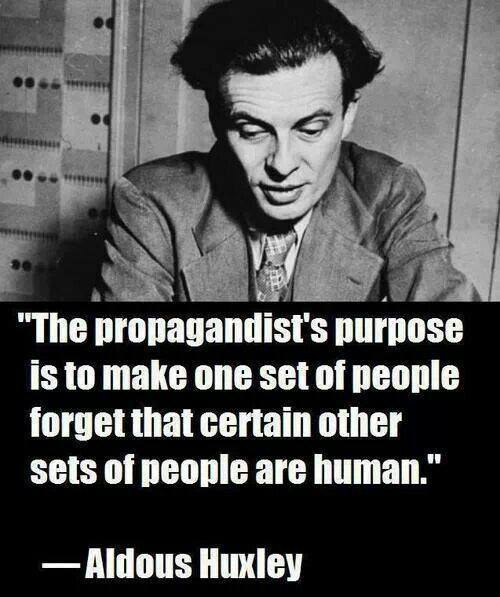
The standard pretexts for demonizing a particular country would be laughable if the results weren’t so grim. For example, the U.S. government and the house-trained media which spread its message would have us believe that Venezuela, a country which regularly holds internationally monitored, closely contested, elections, is a dictatorship which needs to be overthrown, while countries like Egypt, Israel, the Philippines, and Saudia Arabia, whose jails are overflowing with political prisoners, are stalwarts of the free world.
In this issue of Other Voices, we go beyond the mainstream media to look at the complex realities and histories of the current group of official enemies: Venezuela, North Korea, Syria, and Russia. These articles don’t suggest that there is nothing to criticize about these states. There is no doubt that North Korea and Syria, for example, are brutal dictatorships. It is nevertheless possible, as one article suggests, that many people in Syria, faced with the stark choice of a secular dictatorship or rule by the Islamic state or Al-Qaeda, would choose the existing state. North Korea may be a dictatorship, but its international policies have a core of rationality: asking for negotiations and guarantees on non-intervention, while maintaining a military strong enough to deter an American attack.
The ultimate conclusion these articles point to is this: war is not a solution, and U.S.-NATO intervention in other countries invariably makes things worse.
Ulli Diemer
See the August 28 issue of Other Voices here. Sign up to receive Other Voices by email here
Keywords: Intervention – North Korea – Media Propaganda – Regime Change – Russia – Syria – United States Foreign Policy – Venezuela – War Propaganda
Smoke seen coming out of chimney!!
September 2, 2017 - #
The suspicious activities of those Russians never cease, it seems, and neither does the vigilance of the mainstream media in exposing them. A breathless expose by two reporters from the Associated Press alerts us to the fact that smoke was seen coming out of the chimney of the Russian consulate in San Francisco yesterday. A spokesperson for the San Francisco Fire Department contacted by Associated Press confirmed the report: “They had a fire going in their fireplace,” she said. “They were burning something in their fireplace.”
Ulli Diemer
Meeting the Challenge of the Right Other Voices – October 9, 2017
October 9, 2017 - #
The October 9 issue of Other Voices focuses on the challenge of meeting the Right.
When we talk about the Right, it is well to keep in mind that “the Right” is by no means a unified political force or organization, but rather a label used to describe a disparate collection of ideologies, parties, groups, and individuals.
Many of the mainstream political parties which hold government office or form the official opposition in countries such as Germany, Britain, Denmark, the Netherlands, and Canada carry the label ‘conservative,’ meaning that they are on the right of their country“s political spectrum. In most of these countries, little distinguishes these parties from the mainstream parties to their left. If the programs of the conservative parties typically call for austerity and cutbacks in public spending, coupled with more tax breaks for the rich, the programs of their more ‘progressive’ opponents will tend to call for a little bit less austerity and slightly smaller tax breaks for the rich. These parties have been following the same neo-liberal template for decades, and as the failure of neo-liberalism to improve the lives of anyone except the wealthy has become increasingly apparent, they have steadily lost support.

The hegemony of the virtually indistinguishable mainstream parties has been challenged by the emergence of hard-right parties in places such as India, Ukraine, Hungary and Poland (countries where they hold power), in France, where the National Front has become a major political force, and in Germany, where the anti-immigrant AfD finished in third place in the recent national election. With millions of people unemployed or working in marginal precarious jobs, desperation and hopelessness is leading some to listen to right-wing demagogues who offer scapegoats – usually immigrants or other minorities – or who divert their attention to social ‘evils’ such as abortion, homosexuality, and sex education. These far-right parties in fact have no real solutions to offer, but they pose a very real danger to those they target as scapegoats.
Further still to the right are a wide variety of groups and movements that openly flaunt racist and Nazi symbols and rhetoric. These groups and individuals, who have been given the name ‘alt-right’ in the United States, are by no means united, and their numbers are small, but they have shown that they are quite capable of committing serious acts of violence against those they hate. They have been challenged by anti-fascists who work to stop fascists in their tracks whenever they seek to march in the streets.
The strategy and tactics of meeting the challenge of the right are naturally subjects of debate. Those activists who identify with the label ‘anti-fa’ tend to focus their energies on trying to stop fascists from marching. Important as this is, it can also serve to divert energies from the important organizing that needs to be done. The real problem, arguably, is that the right – the more mainstream right as well as the fascists – has succeeded in attracting support among the broader population because they are putting their energies into grassroots political organizing, while much of the left has given up on organizing, or even talking to, ordinary working people.
The emphasis on fascist fringe groups also can lead to ignoring the most dangerous anti-democratic forces. The greatest totalitarian threat comes, not from small fringe groups, but from the state’s security apparatus itself: the police and the myriad agencies that monitor and record everything that we say and do. They are the ones who driving the push to ever-increasing police militarization, surveillance, and restrictions on civil liberties in the name of ‘anti-terrorism.’
Ulli Diemer
See the October 9 issue of Other Voices here. Sign up to receive Other Voices by email here
Keywords: Anti-fascism – Anti-racism – Fascism – Hate – Nazi History – Police State – The Right – Strategies for Social Change – White Supremacy
Left parties Other Voices – November 11, 2017
November 11, 2017 - #
“There is no alternative.” That is capitalism’s message in the neo-liberal era. The rich keep getting richer and richer, millions of people are unemployed, millions more are trying to survive on precarious, marginal, and part-time work, hundreds of millions are without health care, housing, education, or clean water. Environmental collapse is increasingly likely, masses of people are fleeing wars and economic disasters, nuclear war is a real danger. And all that the corporate elite, the corporate media, and the mainstream political parties have to offer is their insistence that there is nothing we can do about it: there is no alternative.
In those countries where some version of liberal democracy still exists, an ever-increasing percentage of the population has stopped participating in elections where none of the parties offer an alternative. The parties that used to offer something for working people – the various versions of social democracy – have been absorbed into the neo-liberal consensus, and where they form governments, alone, or in coalition with other neo-liberal parties, they enforce the same neo-liberal program.

The political vacuum left by the mainstream parties has opened up space for new parties and political movements to emerge on both the right (see Other Voices October 9, 2017 and the left. In recent years, a number of left parties have emerged out of mass movements in countries like Spain (Podemos), Germany (Die Linke), and Greece (Syriza). In Latin America, in the last two decades, left movements or parties have formed governments in Venezuela, Bolivia, Brazil, and Uruguay. In Britain, exceptionally, the emergence of a socialist left has happened within the mainstream Labour Party, inspired by Jeremy Corbyn’s articulation of a socialist vision that has attracted enormous numbers of new members to the party. In the United States, Bernie Sanders’ campaign also showed that a politician who calls himself a socialist can inspire millions of people, though Sanders’ insistence on channelling their energies into the Democratic Party undermined the possibilities for a new political movement that his campaign could have opened up.
What these new left parties/movements have in common is a strategy of engaging in grassroots organizing and also running in elections. They all describe themselves as socialist, though in many cases their programs are more reminiscent of what social democrats used to advocate decades ago: reforms that would tame and manage capitalism rather than abolish it. Their ultimate vision may be a world without capitalism, but their immediate proposals are more modest and incremental, though still significantly to the left of the neo-liberal consensus.
The ambiguities and contradictions in their goals are in large part attributable to the fact that, being based on social movements, they are therefore coalitions incorporating diverse points of view, some radical, some less so.
A second tension is one that emerges in every leftwing political movement that engages in elections. Those who are elected to office, and the party/parliamentary apparatus that surrounds them, are almost inevitably absorbed into the narrow world of elections and parliamentary politics. This is all the more true if a left party manages to attain office.
Indeed, the experience of the left parties to emerge in the last two decades shows that the real test, and the real danger, comes when a left party forms a government, or becomes part of a coalition government.
A coalition by definition requires the parties participating in it to sacrifice parts of their programs. When a socialist party enters a coalition with a non-socialist party, it is always on the basis that the socialist parts of its program are set aside in exchange for including some of the specific reforms it wants in the coalition government’s agenda. The prospect of achieving a share of political office in a coalition can be extremely tempting, but for a left party the result is almost always a political disaster.
The dangers and challenges of achieving office are most starkly posed when a left party comes to power in its own right. Being in government is not the same as being in power, as it soon comes to learn. Real power is wielded by the capitalist class, those who control the levers of finance. When they don’t like the results of an election, they move their money out of the country, and international money markets institute a de facto boycott of the disobedient country. International institutions, such as the European Union and the International Monetary Fund, as well as the biggest and most powerful international institution of all, the American Empire, bring enormous pressure to bear. In this, they have the help of a ‘fifth column’ within the country: the corporate sector (including the corporate media), as well as significant parts of the state apparatus, such as the senior bureaucracy, the police, and the military.
If a left party is to have any hope of surviving and carrying out its program, it has to have a clear understanding of the obstacles it will face, and a strong determination to meet them head on. Even more importantly, it can only succeed if it remains the expression of a broad-based social movement. An isolated left government has no chance. A movement of millions of people which is committed to an ongoing process of social transformation can sustain a left government, even as such a government can help to achieve the goals of the movement.
Ulli Diemer
See the November 11 issue of Other Voices here. Sign up to receive Other Voices by email here
Keywords: Left Parties – Bolivarian Socialism – British Labour Movement – Political Alternatives – Strategies for Social Change – Syriza
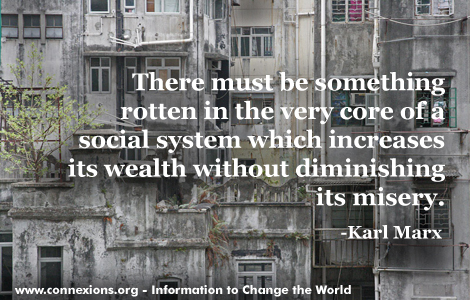
Remembering Lissa Donner
November 2017 - #
Lissa Donner died on November 8, 2017. I hadn’t seen her in a long time, but even so hearing of her death, at the relatively young age of 62, comes as a shock. After I heard of her death, I pulled out the letters we’d exchanged, and re-read them, and then wrote down some of my memories of her, which you can read here.
Protecting individual privacy – with a large dose of hypocrisy
November 24, 2017 - #
In a prominent half-page article in Canada’s highest-circulation newspaper, the Toronto Star, columnist Emma Teitel criticizes “the media” for invading the privacy of the daughter of a prominent politician. The young woman, Teitel admonishes us, “is entitled to some privacy.”
Teitel’s article is accompanied by a large photo of the young woman in question. In her article, Teitel provides detailed examples of personal information “the media” should not be reporting: she tells us who the young woman has dated, where she has been seen, and who she has been seen kissing.
Apparently when other media report this information, they are violating the young woman’s privacy. But when Teitel discloses exactly the same information, accompanied by a huge photo, in the largest-circulation newspaper in the country (and on the paper’s website) she is “defending” the young woman’s privacy.
Ulli Diemer
Collective Memory and Cultural Amnesia Other Voices – December 17, 2017
December 17, 2017 - #
The December 17, 2017 issue of Other Voices, the Connexions newsletter, focuses on Collective Memory and Cultural Amnesia.
Our society is obsessed with the short-term present. It devalues memories and the past. That’s the nature of capitalism, especially the speeded-up hypercapitalism of today. The past is useless: profits are made by getting rid of the old and replacing it with something new.
Certainly this applies to commodities, which, as Marx taught us, are both the incarnation of value under capitalism, as well as the embodiment of capitalist values. Commodities (whether or not they take a physical form) have to be destroyed or made obsolete so that new commodities can be sold.
The need to eclipse the past also applies to ways of living. For the sake of increased profits, steady jobs have to be eliminated and replaced with precarious work. Unions have to be ground down and where possible destroyed. Farmers practising traditional agriculture have to give way to industrial farming, or be forced off their land. Culture has to be packaged as a product so it can be bought and sold.
This ceaseless enterprise of social engineering works best if people can be made to forget that things once were different. Collective memories of unionized jobs with benefits, air you could breathe and water you could drink without being poisoned, times when you could live your life without being spied on by the government and the corporations – such memories are dangerous. It’s best if people forget that such things ever existed.
Even more dangerous are collective memories of resistance – times when people got together, and fought for their rights, sometimes winning, sometimes losing. The very idea that things were different in the past, and could be different in the future, is perilous because it gives people dangerous ideas.
Official society, including the mainstream media, busily carry on their daily work of fostering social amnesia, focusing on the present and the trivial, while erasing the past by misrepresentation or neglect. Certainly neither media nor governments have any interest in having people remember the lies that were used to justify past wars and past crimes. Recycled lies (including promises of a better future) work best if people don’t remember how often the same false tales have been told in the past.
But there are those who do remember, and who work to preserve and share our collective memory. They do their work for different reasons, in different places.
Sometimes the impulse is nationalist or even racist. Those who live on conquered or stolen land rarely care to remember much about how the land came to be theirs. They prefer collective myth to collective memory.
But they have to contend with the collective memories of those who were displaced. From Canada to Palestine, from South Sudan to Burma, people are working to document their stories and bring them to the attention of the world. In such instances, and others, the burning impulse is truth: to tell what happened to us.
Other initiatives and projects – Connexions itself is an example – see historical memory as a way of contributing to the struggle for a different world. For us, knowledge of history is subversive, and remembering can be a form of resistance. To understand how we can change society, we have to understand it. That means understanding where it – where we – came from.
When we know and understand more about those who came before us lived and fought, we can gain a deeper understanding of how we can best live and fight.
In this issue of Other Voices, the last of 2017, we share some stories about people's struggles to use collective memory as a form of resistance and a tool for creating a better world.
Ulli Diemer
See the December 17 issue of Other Voices here. Sign up to receive Other Voices by email here
This article is also available in French.
Keywords: Collective Memory – History – Left History – Memory – Oral History – People’s History
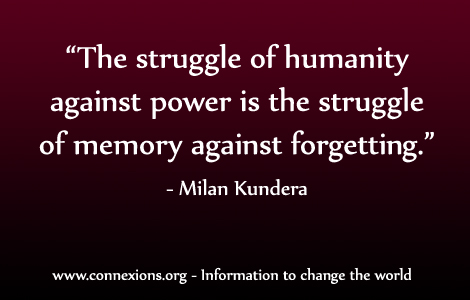
What are we eating? Other Voices – January 21, 2018
January 21, 2018 - #

What are we eating? A simple question which opens up a labyrinth of devilishly complex issues about production and distribution, access to land, control of water, prices, health and safety, migrant labour, and much else.
For millions of people, the answer is brutally simple: not enough to survive. UNICEF estimates that 300 million children go to bed hungry each night, and that more than 8,000 children under the age of five die of malnutrition every day. The UN’s Food and Agriculture Organization (FAO) estimates that 12% of the world’s population is chronically malnourished.
How is this possible in a world where there is an enormous surplus of food, where farmers are paid not to grow food?
A short answer is that food production and distribution are driven by the need to make profits, rather than by human needs. The international system of corporate-dominated food production and sales that is misleadingly referred to as the “market” exists to maximize corporate profits. Everything follows from that. The ‘market’ responds to ‘demand’ (though that ‘demand’ is often artificially created by marketing campaigns). Bottom line: if people are hungry because they have no money to buy food, they don't create a ‘demand’ for food, and the ‘market’ doesn’t produce or allocate food for them.
This is not a new development. During the Irish famine of the 1840s, when one million people died of starvation, rich landowners were exporting food from Ireland. Why? Because foreign buyers could afford to pay, whereas the Irish peasants had no money with which to buy food. The Ethiopian famine of the 1980s was a similar story: the country was producing enough grain to feed everyone, and indeed continued to export food during the height of the famine.
In the past few decades, the increasing corporatization of the food system has been bringing about enormous changes.
In North America, traditional family farms are a threatened species. Large industrial farms expand, while smaller farms sell out to the big operations or, if they are close to cities, to real estate speculators and builders. Large or small, nearly all farmers are heavily in debt and trapped on a treadmill of borrowing against next year’s earnings to buy this year’s seeds, fertilizers, and pesticides, all controlled and sold by huge agribusiness corporations.
In Africa, land that has been farmed by local farmers for countless generations is being taken over by foreign mega-operations, many of them Chinese. In India, international agro-chemical monopolies have been pushing GMOs and new crop varieties, resulting in a series of rural disasters, whose consequences include a horrific wave of farmer suicides.
Another worry for anyone who consumes food – that is, everyone – is the safety of the foods that we consume. We are all guinea pigs in a massive, unprecedented, and uncontrolled experiment on human health and the earth’s ecosystems. What happens when our bodies, our lakes and rivers, our soil, and our air are saturated with an ever-increasing broth of chemicals, antibiotics, and genetically modified lifeforms?
If there is good news in all this, it is the fact that so many people are coming together to resist in various ways, large and small. This issue of Other Voices highlights a few. Many more stories and resources can be found via the Connexions website.
Ulli Diemer
See the January 21 issue of Other Voices here. Sign up to receive Other Voices by email here
The article is also available in Arabic.
Keywords: Food – Food Sovereignty – Industrial Agriculture – Seeds – Urban Agriculture
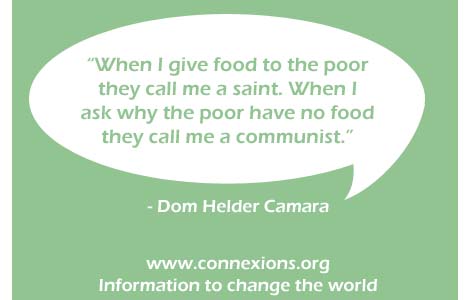
A puzzling moment in the park
February 14, 2018 - #
A woman is playing with her dog. It’s a friendly tail-wagging German Shepherd, excited by their game of fetch, tugging on the stick in her hand, impatiently waiting for the next throw.
“When you start approaching the final stages,“ she tells it, “you start to lose focus, and that’s when you get into trouble.”
I’m bemused. I know that German Shepherds are quite intelligent, but even so this seems like awfully sophisticated feedback to be giving a dog. And anyway, the dog seems very focused indeed.
The woman continues speaking. I realize that she talking to someone on the phone. Presumably not a dog.
The German Shepherd runs happily after the stick, and I too trot on my way.
Ulli Diemer
Hearts and Minds: How Do People Change? Other Voices – February 17, 2018
February 17, 2018 - #

If we want to change the world, we need other people – millions, eventually hundreds of millions of others – to agree that the world needs changing and to join us in changing it.
It’s a daunting prospect. How can we reach and persuade those who may have voted for the likes of Donald Trump and those like him in other countries, or who are not interested in engaging in ‘politics‘ at all?
Many on the left practise their own version of political disengagement. With the best of intentions but questionable priorities, they reach out to the already converted to organize actions which bring together the same small groups of people to proclaim their principled dissent from the status quo. What is all too commonly missing is any attempt to reach out to the vast majority of the population, those who won’t come to, or ever even hear about, the protests of the left.
How can we reach the millions we need to reach and engage if fundamental change is to happen? How can we accomplish the essential task of persuading a majority of the population that a fundamental social and economic transformation is necessary?
Even more importantly, what will it take for people to come together and act collectively to bring about that transformation? What can we do to help make this happen?
This newsletter presents a number of approaches to answering this crucial question. At heart, though, they share the same fundamental wisdom: you do it by talking to people. One-on-one, or in small groups. And talking to people, having conversations, means listening and asking questions. A good organizing conversation, says Jane McAlevey, is 70 per cent listening and 30 percent talking. The key to canvassing people door-to-door, says Momentum, is asking people what they are concerned about, and listening to their answers.
There is another crucial element to this approach: it means talking to strangers. People you don’t know, people who aren’t political. On their doorsteps, on the street-corner, in front of public buildings.
While every conversation we have can potentially have an impact, to be effective in bringing about social change, such conversations need to be part of a strategy for organizing. Groups working for change need to prioritize organizing that reaches out to people, ordinary people, where they work, live, shop, and play.
Finally, we need to understand that having conversations and listening to people is not a mere tactic, a technique to get them to listen to what we have to say. Listening to people means hearing what they say, and learning from it. We don’t have all the answers. We have much to learn, and we have to be open to learning. It is not only other people, but we too, who need to change if the world is to change.
Ulli Diemer
See the February 17 issue of Other Voices here. Sign up to receive Other Voices by email here
Keywords: Community organizing – Compassion – Empathy – Grassroots Campaigns – Kindness – Labour Organizing – Left-Wing Politics – Listening – Organizing – Transformation
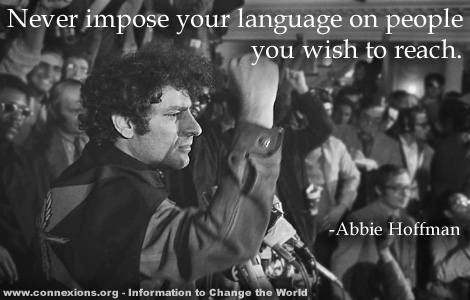
Looking for answers, creating alternatives Other Voices – March 25, 2018
March 25, 2018 - #
The March 25, 2018 issue of Other Voices features people who are questioning and challenging the way the world works and trying to create better alternatives.

Phyllis Omido, a courageous environmental activist in Kenya who faced arrest and physical intimidation, has led a successful campaign to force a lead-smelting company that was poisoning residents to shut down.
Justin Podur challenges the way the corporate media systematically spread lies and misinformation about Venezuela, a country faced by a systemic campaign of economic sabotage led by local elites and supported by the United States and its allies.
Judith Deutsch reviews Norman Finkelstein’s new book on Gaza. She asks: why are states and corporations assumed to have a “right to exist” but people – specifically, in this case, the people of Gaza – are not said to have a right to exist.
Bruce Lesnick asks what is the best way to organize against the mobilizations of the right. Most crucially, he asks, “how can we best harness the power of the 99% – the working class majority – in this ideological, social and economic battle?”
The book of the week is “Creating an Ecological Society: Toward a Revolutionary Transformation” by Fred Magdoff and Chris Williams. They set out to show that it is possible to envision and create a society that is genuinely democratic, equitable, and ecologically sustainable. And that it is possible – not one moment too soon – for society to change fundamentally and be brought into harmony with nature.
See the March 25 issue of Other Voices here. Sign up to receive Other Voices by email here
Keywords: Alternatives – Counter-revolution – Ecosocialism – Gaza – Israeli War Crimes – Organizing – The Right – Venezuela

Why aren’t we expelling Israel’s diplomats?
(Letter to the editor)
March 31, 2018 - #
Last week Canada expelled Russian diplomats on the strength of unsubstantiated allegations that Russia was involved in the poisoning of a former spy in Britain. Foreign Affairs Minister Chrystia Freeland called the incident a “despicable, heinous and reckless act, potentially endangering the lives of hundreds.”
This week, Israeli military snipers killed 15 peaceful demonstrators in Gaza and injured hundreds of others with live fire.
Is there any way to characterize this massacre as anything other than a “despicable, heinous and reckless act?”
Will the Government of Canada now expel Israeli diplomats to show its condemnation of Israel’s actions?
Guidelines for police in dealing with mentally ill people
April 5, 2018 - #
An investigative report by the CBC shows that more than 460 people in Canada have “died in encounters with police” since the year 2000. Why do they say “died in encounters with police” rather than “killed by police”? Well, because some people have a perverse tendency to die from heart attacks or other sudden medical emergencies while being tasered or beaten up. That’s not our fault, the cops always say.
In any case, the CBC’s report shows that 70% of those who died suffered either from mental illness or substance abuse problems, or both. A disproportionate number are black.

Predictably, this report concludes, as all such reports do, that the police need more “training” to deal with mentally ill people. Police spokespeople agree that more training would be a good thing, but they complain that it’s so hard to get that training, and to get it right. “We’re not getting information about what kind of words or actions might trigger more aggressive behaviour, or what kind of words or actions might have a calming effect on a person in a crisis,” complains the president of the Canadian Police Association.
Strangely, though, other people who regularly encounter persons in crisis, for example emergency room nurses, or staff at drop-in centres, or even bouncers in bars, seem able to calm things down without shooting anyone or tasering anyone. What secret knowledge do they have that eludes the cops?
I don’t claim to have the skills to provide training in this area, but let me offer these initial guidelines for our puzzled cops:
1) Don’t shoot.
2) Back off.
3) Don’t shoot.
4) Speak calmly and ask if you can help.
5) Don’t shoot.
Ulli Diemer
Related:
Whose problem?
Are the police doing their job?
The end of carding?
Keywords: Killings by Police – Police Training
Misleading figures on greenhouse gas emissions
(Letter to the editor)
April 12, 2018 - #
A letter to the editor from an oil industry apologist (April 12) tries to excuse the Alberta oilsands’ growing carbon emissions with the argument that Canada accounts for “just” 1.6 per cent of global greenhouse gas emissions. Even if that figure were accurate, it would mean that Canada is producing emissions which are more than three times as large as its proportion of the world’s population. In order not to exceed its share, Canada would need to reduce its emissions by at least two-thirds.
But in fact the figure of 1.6 per cent omits a huge portion of Canada’s greenhouse gas emissions. It is based on the pretense that if the oil the industry extracts from the ground isn’t burned until after it is shipped across the border, then we aren’t responsible. This is nonsense. It’s like saying that if you throw your garbage across the fence into your neighbour’s backyard, it’s her problem and you bear no responsibility for it.

The make-believe number of 1.6 per cent also ignores the fact that a substantial proportion of Canada’s emissions are actually produced in countries like China in the course of manufacturing goods that we consume. If factories in Asia are burning fossil fuels in order to produce goods for us, then those are also our emissions. We also need to add the enormous consumption of fossil fuels produced by shipping products across the ocean. The shipping industry, together with air transport and air travel, are huge contributors to carbon emissions and therefore to global climate change, yet we pretend we don’t need to count them.
Canada’s energy-wasting economy, and Canada’s petroleum industry in particular, are urgent problems for the entire planet. We need to accept this fact and act on it, without deluding ourselves with misleading statistics.
Ulli Diemer
Keywords: Alberta Oil & Tar Sands – Carbon Dioxide Emissions – Climate Change – Greenhouse Gas Emissions – Oil & Gas Industry
Their Internet or Ours? Other Voices – April 21, 2018
April 21, 2018 - #
What happened to the Internet? The Internet, which was at one time a free and open space for sharing information and ideas, has been privatized and twisted to serve the profit-making agenda of huge corporations, working hand-in-glove with governments which want to suppress opposition and alternatives. What can we do about it? Is it our Internet or theirs?
Some thirty years ago, the Internet, which up to that time had been a communications network used by the U.S. military and a handful of elite academic institutions, was becoming available to tech-savvy members of the public. Electronic Mail (E-mail) was coming into wider user. USENET discussion groups and Bulletin Board Systems (BBS), which allowed users the ability to share information and engage in discussions with like-minded individuals, were proliferating. In the late 1980s, Tim Berners-Lee developed the Hypertext Transfer Protocol (HTTP), a key break-through which made the World Wide Web possible.
A fundamental dimension of the Internet of that time was its hostility to any form of commercial or corporate use. Many systems expressly forbad all advertising or the use of email to send commercial messages of any kind. Servers were run by non-profit institutions.
But the very openness of the Internet made it possible for companies to set up their own Web presence. Commercial Internet Service Providers sprang into being. There was no governing authority which could stop them, and with limitless amounts of money and resources at their disposal, within a few years their presence swamped the anarchic early Internet. Aspects of Internet management were privatized by the U.S. government. Private companies were created to sell Internet domain names, requiring any organization with a website to pay an annual licensing fee to a private company. If there were disagreements about the use of a domain name, large corporations would almost automatically prevail over small non-profits.
In the new millennium, these trends accelerated. New forms of communications networks were created, and nearly all were controlled by corporations. Cell phones used networks owned by private companies: an inefficient and wasteful, but very profitable, approach. Social media and communications apps sprang into being, and even though they are perfectly suited to being controlled co-operatively by their users and the workers who maintain them, they are almost all corporate.
As the Internet became privatized, the dominant corporations were no longer content to merely publish advertising in the manner of the print media. Now, they entered the high-profitable business of spying on their users: gathering every possible piece of information about them, and then not only using that information to target their own ads, but also selling it to any other commercial entity with the budget to pay for it. The state, in the form of its national security establishments, gets to access the data as well.
Governments did everything they could to facilitate the commercialization and corporatization of the Internet, but they also have their own agendas. A key preoccupation for a government is maintaining its own legitimacy. The mainstream media, including online media platforms, play an important part in what Noam Chomsky and Edward Herman call “manufacturing consent.”
But a problem with the Internet is that it allows for alternative points of view to be disseminated as well. Even though alternative media and individual bloggers have nowhere near the reach of the commercial and state media, some at least have attracted large audiences because they challenge the official narratives. They have helped to undermine the credibility of governments and mainstream media because they continually challenge their lies and distortions. Those in power see this as a major problem, and an intolerant affront.
The result has been another set of manoeuvres to push these insolent challengers deeper into the shadows. One part of this corporate-state offensive has been legislation to end “net neutrality” in the United States. Whereas previously all information on the Internet moved in the same way, over the same available bandwidth, now corporations that control the technical infrastructure are allowed to give priority to some information, while slowing down other content. This will mean that websites owned by companies able to pay for better service will be served up fast, while those who aren’t able to pay will be slowed down. Given the nature of the Internet, where people expect to click on something and then see it instantly, sites that take five or ten seconds to load because they are on the slowed infrastructure will lose a huge percentage of their users.
Meanwhile corporations like Google and Facebook, in the name of combating ‘fake news’ and ‘anti-social’ views, are taking steps to downgrade or effectively eliminate views critical of the status quo. Google has changed its algorithms to downgrade or disappear content from many alternative websites. Facebook is filtering its newsfeeds to ensure that the ‘news’ being shared comes from ‘reputable’ sources. By reputable sources, they mean the corporate media.
What can we do? The articles in the April 21, 2018 issue of Other Voiceshelp to explain the dimensions of the problem. They offer some tools, for example tools for protecting your privacy and securing your devices, and they make some suggestions, such as moving away from corporate platforms to the extent that you feel able to do so.
One important thing you can do is share content that appears in the alternative media and on alternative websites (e.g. Connexions) When we share content directly (whether in social media, by email, etc.) we give a boost to critical views and analyses, and help more people to find them and see them.
Ulli Diemer
See the April 21 issue of Other Voices here. Sign up to receive Other Voices by email here
Keywords: Censorship/de facto – Corporate Agenda – Fake News – Free Software – Internet/Equality of Access – Open Source Software
This article is also available in
Chinese,
Farsi
and
French.
Massacres and Morality
June 10, 2018
As long as there have been states and armies, there have been massacres. In previous centuries, these were openly acknowledged for what they were: acts of terrorism against those who resisted their rulers or their conquerors, or those who seemed likely to resist in the future. Terrorism was understood by all to be what a state did to keep subjugated populations in line, at home or abroad.
In the modern era, however, rulers of the major colonial powers were confronted by working class struggles in their own countries, including struggles for democracy, at the same time as they were faced with the need to put down the resistance of colonized peoples against their colonizers.
Democracy, even in its limited parliamentary form, was seen as a terrible threat. The British ruling class never forgot that Parliament had tried and executed the king, Charles I, in 1649. The French never forgot that the Revolution had beheaded Louis XI in 1793.
In this new and dangerous world, shaping public opinion became increasingly important for those in power. If the people were going to be allowed to vote, then they had to be made to believe in the legitimacy of the existing social system, and ideology and propaganda are more effective tools for doing this than naked force. In the context of colonialism, the public at home, and the officials and soldiers who imposed their rule on the colonies, needed to be told that what they were doing, no matter how brutal, was done in the interests of defending Western values and Western civilization. In the colonies themselves, it was desirable to persuade the elites, at least, that they too would benefit from colonial rule, which, after all, was bringing them the benefits of Western civilization.
The problem with propaganda, however, is that it is often starkly at odds with reality. When people don’t buy into the lies they have been told, they can become dangerous.
And so, all too often, it seems that defending civilization requires massacres.
Miriam Garfinkle 1954 - 2018
September 16, 2018
My partner Miriam Garfinkle died on September 15. The obituary I wrote for her appears below. I also delivered a eulogy at her memorial which you can read here.
Miriam died at home, surrounded by the love of her family and friends. Left to mourn, and to cherish her memory, are her partner Ulli Diemer, her daughter Leah, her son Simon and daughter-in-law Melissa, her grandson Ben, sisters Diane (David) and Carol (Johnny), her nieces, nephews, great-nieces, great-nephews, and those she called her “chosen family”.
Her chosen family was large, because she touched so many lives: Smadar, Reem, Miriam M., Peggy, Judy, Sini and Kai especially were like family in every sense, and many others were deeply woven into her extraordinary network of relationships.

She was an amazing mother to Simon and Leah, and she watched their progress in life with pride and devotion. In her last 18 months, it gave her great joy to see her grandson Ben blossoming into the world.
Dr. Miriam, as she was known to her patients, practised medicine in Toronto for more than 30 years. As a physician, she engaged with her patients in a way that went far beyond the provision of clinical services. She was a doctor who would make a ‘house call’ on a homeless patient in the park where he lived, head out without her coat in the middle of winter to find a patient having a mental health crisis, or drive twenty kilometres to the home of a patient who didn't have a phone when she received a lab result that needed immediate action.
Miriam spent many years working at the Immigrant Women’s Health Centre and at the Regent Park Community Health Centre, where she was known, not only for her conscientiousness and compassion, but for her sense of humour and infectious laugh. Her concern was not only for her individual patients, but for the social conditions that lay at the root of many of their problems. On her own time, she fought for an increased minimum wage, lobbied for better funding for reproductive health care for immigrant women, and occupied a cabinet minister’s office to demand full funding for health care for refugees.
Her activism went far beyond issues related to health care. Raised in a left-wing secular Jewish family, she was eight years old when she wrote her first political letters, to U.S. President Kennedy and Soviet Premier Khrushchev, asking them to stop testing nuclear bombs. As she told them, “I am sure me and everybody else will appreciate it.” When she was fourteen, she spent Saturday afternoons leafleting outside her local supermarket in support of striking farmworkers.
The cause of the Palestinian people was central to her political activism. As a Jew, she felt a special obligation to speak out about this and to say “Not in my name.” She saw the parallels between the oppression of Palestinians and the oppression of indigenous peoples in Canada, and she spoke up often for indigenous rights.
What tied her diverse involvements together was a fierce commitment to justice, to doing what was right. She was a committed socialist who was enraged by injustice and never wavered in her belief that the world had to rid itself of capitalism and replace it with a new society based on justice and grassroots democracy.
Befitting someone who was a force of nature, Miriam was happiest when she was out in nature, be it in Toronto’s High Park, Pukaskwa on Lake Superior, or Gros Morne in Newfoundland. Famously impatient with urban annoyances like traffic jams (she would get off the bus and walk rather than sit in traffic), she could spend hours in the woods watching and listening to birds and frogs. At home she was often outdoors gardening, or trying (always failing, but never giving up) to find a foolproof way to keep squirrels and raccoons from raiding her bird feeder.
Perhaps her greatest loves in life were music and dancing. She played piano, guitar, banjo, and sopranino, and she danced at every opportunity, be it at a “mug-up” in Newfoundland, a folk dance in the park, or dancing with Ulli in her own kitchen.
Whatever she did, she did with passion and a sense of joy. She will be missed, but those who lives she touched will remember her for as long as they live.
Interment was at the Necropolis Cemetery. A memorial gathering to celebrate Miriam’s life was held on October 28, 2018, at 918 Bathurst Street in Toronto, with about 300 people in attendance. I delivered a eulogy, which you can find here.
Memories of Miriam, and tributes to her life, can be found on the Moments with Miriam page: HTML – PDF. A collection of Miriam’s articles, interviews, talks, letters, activism and photos can be found at www.diemer.ca/Miriam/.

Miriam’s Nature Calendar 2019
December 8, 2018 - #
I created a calendar for 2019 featuring photos taken by my partner, Miriam Garfinkle, who died on September 15. Miriam was frequently out in nature, and she’d often have a camera with her. I gathered up some of the photos she took and compiled them in Miriam’s Nature Calendar 2019. I printed about 120 copies for friends and family. The PDF version is available online.

Nature Calendar January: Red Fox
January 1, 2019 - #

Miriam’s Nature Calendar, January: Red Fox, Algonquin Park. Photo by Miriam Garfinkle.
Nature Calendar February: Ice, Toronto Islands
Feburary 1, 2019 - #

Miriam’s Nature Calendar, February: Ice formation, Toronto Islands. Photo by Miriam Garfinkle.
Nature Calendar March: Red-necked Grebes
March 1, 2019 - #

Miriam’s Nature Calendar, March: Red-necked Grebes, Colonel Sam Smith Park, Toronto. Photo by Miriam Garfinkle.
Nature Calendar April: Rondeau
April 1, 2019 - #

Miriam’s Nature Calendar, April: Trees in Spring, Rondeau Provincial Park. Photo by Miriam Garfinkle.
Nature Calendar May: Sleeping Baby Raccoon, Point Pelee
May 1, 2019 - #

Miriam’s Nature Calendar, May: Sleeping Baby Raccoon, Point Pelee. Photo by Miriam Garfinkle.
Nature Calendar June: Wood Duck mother with chicks
June 1, 2019 - #

Miriam’s Nature Calendar, June: Wood Duck mother with chicks, High Park, Toronto. Photo by Miriam Garfinkle.
Nature Calendar July: Puffin, Newfoundland
July 1, 2019 - #

Miriam’s Nature Calendar, July: Atlantic Puffin, Bonavista Peninsula, Newfoundland. Photo by Miriam Garfinkle.
Nature Calendar August: Humpback Whale
August 1, 2019 - #

Miriam’s Nature Calendar, August: Humpback Whale, Witless Bay, Newfoundland. The aquamarine colour is a manifestation of the whale’s 5-metre-long flipper just below the surface of the water. Photo by Miriam Garfinkle.
Previous: Notebook 7 — Next: Notebook 9